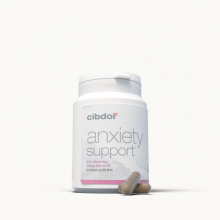How to deal with unbearable anxiety?
Last updated:
Published:
 Dealing with unbearable anxiety can be overwhelming and challenging. However, there are several strategies and techniques that can help you manage your symptoms and improve your overall well-being.
Dealing with unbearable anxiety can be overwhelming and challenging. However, there are several strategies and techniques that can help you manage your symptoms and improve your overall well-being.
Contents:
- Understand Your Anxiety
- Practice Relaxation Techniques
- Challenge Negative Thoughts
- Take Care of Your Physical Health
- Consider CBD as a Complementary Approach
- Seek Professional Help
- The Bottom Line
-
Frequently Asked Questions (FAQs)
- What are some common triggers for unbearable anxiety?
- How can I support a loved one dealing with unbearable anxiety?
- Can lifestyle changes help manage unbearable anxiety?
- Is it normal to experience unbearable anxiety?
- How long does it take for anxiety treatment to work?
- Can CBD interact with anxiety medications?
- How can I find a mental health professional to help with unbearable anxiety?
- Summary:
Understand Your Anxiety
The first step in dealing with unbearable anxiety is to understand what you're experiencing. Anxiety is a normal response to stress, but when it becomes excessive and persistent, it can interfere with daily life.
Symptoms of anxiety may include:
- Constant worry or fear
- Restlessness or irritability
- Difficulty concentrating
- Sleep disturbances
- Physical symptoms like racing heart, sweating, or trembling
Recognizing these symptoms can help you identify when your anxiety is becoming unbearable and take steps to address it.
Practice Relaxation Techniques
Relaxation techniques can be powerful tools for managing unbearable anxiety. These techniques help calm your mind and body, reducing the intensity of your symptoms.
Some effective relaxation techniques include:
- Deep breathing exercises
- Progressive muscle relaxation
- Mindfulness meditation
- Yoga or gentle stretching
Incorporate these techniques into your daily routine to help manage your anxiety on an ongoing basis.
Challenge Negative Thoughts
Anxiety often involves negative or irrational thoughts that can fuel your symptoms. Learning to challenge these thoughts can help reduce their impact and make your anxiety more manageable.
Ask yourself:
- Is this thought based on facts or assumptions?
- What evidence do I have to support or refute this thought?
- Is there an alternative way of looking at this situation?
By questioning your negative thoughts, you can develop a more balanced and realistic perspective, which can help reduce your anxiety.
Take Care of Your Physical Health
Your physical health can have a significant impact on your mental well-being, including your anxiety levels. Taking care of your body can help you better manage unbearable anxiety.
Some key aspects of physical self-care include:
- Getting enough sleep
- Eating a balanced, nutritious diet
- Engaging in regular exercise
- Limiting caffeine and alcohol consumption
Making positive changes to your lifestyle can help support your overall well-being and reduce the intensity of your anxiety symptoms.

Consider CBD as a Complementary Approach
CBD, or cannabidiol, is a natural compound found in the hemp plant that has gained attention for its potential to help manage anxiety. While more research is needed, some studies suggest that CBD oil may have anxiolytic properties and could be a useful complementary approach for dealing with unbearable anxiety.
If you're interested in trying CBD for anxiety, consider the following:
- Choose high-quality, third-party tested CBD products
- Start with a low dose and gradually increase as needed
- Consult with a healthcare professional, especially if you're taking medications or have a pre-existing health condition
Remember, CBD is not a replacement for professional medical advice or treatment. It's essential to work with a qualified healthcare provider when managing unbearable anxiety.
Seek Professional Help
If your anxiety becomes overwhelming and significantly impacts your daily life, it's crucial to seek professional help. A mental health professional, such as a therapist or counselor, can provide you with personalized strategies and support for managing your anxiety.
Some effective treatment options for anxiety include:
- Cognitive-behavioral therapy (CBT)
- Exposure therapy
- Medication, such as anti-anxiety drugs or antidepressants
Don't hesitate to reach out for help if you're struggling with unbearable anxiety. With the right support and resources, you can learn to manage your symptoms and improve your quality of life.
The Bottom Line
Dealing with unbearable anxiety can be a challenging and ongoing process, but there are many strategies and resources available to help you cope. By understanding your anxiety, practicing relaxation techniques, challenging negative thoughts, taking care of your physical health, considering complementary approaches like CBD, and seeking professional help when needed, you can develop a comprehensive plan for managing your anxiety and improving your well-being.
Remember, you're not alone in this journey. With patience, self-compassion, and the right support, you can learn to navigate unbearable anxiety and lead a fulfilling life.

Frequently Asked Questions (FAQs)
What are some common triggers for unbearable anxiety?
Common triggers for unbearable anxiety can include:
- Stressful life events, such as job loss or relationship problems
- Traumatic experiences
- Health concerns
- Financial worries
- Social situations or public speaking
Identifying your specific triggers can help you develop targeted strategies for managing your anxiety.
How can I support a loved one dealing with unbearable anxiety?
To support a loved one dealing with unbearable anxiety:
- Listen without judgment and offer empathy
- Encourage them to seek professional help
- Help them practice relaxation techniques
- Offer practical assistance, like accompanying them to appointments
- Educate yourself about anxiety to better understand their experience
Remember to take care of your own well-being, too, as supporting someone with anxiety can be emotionally taxing.
Can lifestyle changes help manage unbearable anxiety?
Yes, lifestyle changes can play a significant role in managing unbearable anxiety. Some helpful changes include:
- Establishing a regular sleep schedule
- Engaging in regular physical activity
- Practicing stress-management techniques, like deep breathing or meditation
- Limiting caffeine and alcohol intake
- Maintaining a healthy, balanced diet
Incorporating these changes into your daily routine can help reduce the intensity and frequency of anxiety symptoms.
Is it normal to experience unbearable anxiety?
While it's normal to experience some level of anxiety in response to stress or challenging situations, unbearable anxiety that significantly impacts your daily life is not typical and may indicate an underlying anxiety disorder. If your anxiety feels overwhelming and persistent, it's essential to seek professional help.
How long does it take for anxiety treatment to work?
The timeline for anxiety treatment effectiveness varies depending on the individual and the specific treatment approach. Some people may notice improvements within a few weeks, while others may require several months of consistent treatment.
It's important to be patient and commit to the treatment process, as it may take time to find the right combination of strategies that work for you.
Can CBD interact with anxiety medications?
Yes, CBD can potentially interact with certain anxiety medications, particularly those metabolized by the liver. If you are taking any medications for anxiety or other health conditions, it's crucial to consult with your healthcare provider before using CBD to ensure it's safe and appropriate for your individual situation.
How can I find a mental health professional to help with unbearable anxiety?
To find a mental health professional specializing in anxiety treatment:
- Ask your primary care physician for referrals
- Contact your insurance provider for a list of in-network mental health professionals
- Search online directories, such as Psychology Today or the Anxiety and Depression Association of America
- Ask trusted friends or family members for recommendations
When selecting a mental health professional, consider their experience, treatment approach, and your personal comfort level with them.
Summary:
Dealing with unbearable anxiety can be challenging, but there are strategies and techniques to help manage symptoms and improve well-being. Understanding anxiety, including its symptoms and triggers, is the first step in addressing it effectively. Practicing relaxation techniques, such as deep breathing, mindfulness meditation, and yoga, can help calm the mind and body, reducing the intensity of anxiety symptoms.
Challenging negative thoughts and developing a more balanced perspective is another key aspect of managing unbearable anxiety. Taking care of physical health through proper sleep, nutrition, exercise, and limiting caffeine and alcohol consumption can also support mental well-being and reduce anxiety levels.
Considering complementary approaches, like CBD oil, may be helpful for some individuals, but it's essential to choose high-quality products, start with a low dose, and consult a healthcare professional, especially when taking medications or having pre-existing health conditions.
Seeking professional help is crucial when anxiety becomes overwhelming and significantly impacts daily life. Therapy, such as cognitive-behavioral therapy (CBT) or exposure therapy, and medication can be effective treatment options. Supporting loved ones with unbearable anxiety involves listening without judgment, encouraging professional help, and assisting with relaxation techniques.
Remember, managing unbearable anxiety is an ongoing process that requires patience, self-compassion, and the right support. By understanding anxiety, implementing coping strategies, considering complementary approaches like CBD, and seeking professional help when needed, individuals can learn to navigate their symptoms and improve their quality of life.










